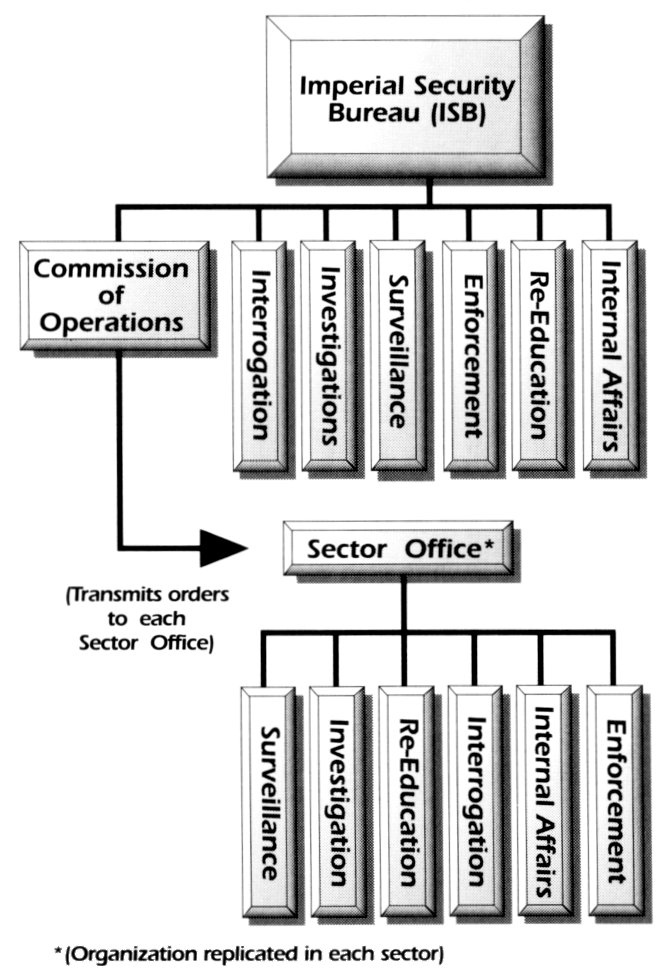Imperial Security Bureau
Imperial Security Bureau
| |
|---|---|

| |
| General Information | |
|
Organization Type |
Enforcement |
|
Scale |
16 (Multiple Galactic Regions) |
|
Founder(s) | Crueya Vandron |
|
Leader(s) | Crueya Vandron |
| Historical Information | |
|
Formed From |
|
|
Founding |
19 BBY |
| Other Information | |
|
Era(s) | Rise of the Empire Era |
|
Affiliation |
|
Faction
- Era: Rise of the Empire Era
- Source: Home
The Emperor's advisers created the Imperial Security Bureau (ISB) as a direct competitor to Imperial Intelligence. The ISB is staffed with New Order loyalists, a situation that results in less objective, though dedicated and enthusiastic, information gathering. The ISB performs a combination of secret police and intelligence duties. Its agents are equally at ease operating in public or clandestinely and are not afraid to identify themselves when necessary. ISB agents are perceived to be everywhere.
The ISB operates and enormous central office on Imperial Center. It actively competes with Imperial Intelligence to gather the best data, albeit with a loyalist slant. It has offices and officers scattered throughout the galaxy and can be found on every major world. The Commission of Operations transmits assignments through the Central Office directly to the Sector Officer for the branch in question; Surveillance, Investigations, Internal Affairs, Interrogation, Re-Education, and Enforcement. Any coordinated actions between the different branches within a sector, or between ISB resources in separate sectors, is dictated by the Commission and direct by the Central Office. Independent coordination by sector resources is strongly discouraged.
Divisions of the Imperial Security Bureau
The Imperial Security Bureau is subdivided into the component divisions of Surveillance Branch, Branch], Internal Affairs Branch, Interrogation Branch, Re-Education Branch, and Enforcement Branch.

| |
Surveillance Branch
Surveillance is the largest branch of the ISB, containing nearly 35 percent of all active personnel. The quality of recruits varies greatly within Surveillance. The spectrum includes promising, eager, but poorly trained candidates straight from SAGroup, CompForce Observers with better training, veteran officials from Progress's Sector Monitors or Improvement's Sector Development, to local contacts with an interest in subverting other local powers.
Surveillance's main purpose is to uncover beings or activities which might be helpful to local resistance or sedition groups, or otherwise obstruct the Empire's plans. If Surveillance has enough suspicions, they will turn the case over to Investigations so more thorough action can be taken.
The second purpose of Surveillance is putting the fear of the Empire into citizens who can be scared out of helping any resistance group.
This is the use to which the rawer recruits and less skillful veterans are often employed.
Investigations Branch
Investigations draws its talent from proven agents in Surveillance, also drawing a substantial number from the Modification operatives who are looking to put their expertise to use in a new direction. Their professionalism and expertise is considerably higher than that of Surveillance.
Investigations agents have direct communication links to military forces in the area. These links are pre-approved by the Select Committee and the appropriate Moff or Grand Moff. Investigations individuals or teams may therefore call on a considerable degree of firepower if things become rough. This action was taken as a way of cutting down response times to legitimate threats which are too large to be handled even by a team of competent agents.
It is a measure of the success the ISB has enjoyed with this tactic that even home-grown resistance forces can find themselves forced from heavily developed worlds, where ISB agents could operate unnoticed, to backwater worlds which deprive the ISB agents of convincing over identities.
Internal Affairs Branch
Internal Affairs watches the rest of COMPNOR. Closely. Their agents pay special attention to Science, Commerce, and Justice groups within the Coalition for Progress, and Enforcement Branch in the ISB. Whether or not Internal Affairs has the authority to monitor the Select Committee is not clear; it is clear that Internal Affairs does not consider the Select Committee to be above suspicion. COMPNOR rules and procedures have always been pretty sloppy on the point of internal policing of their own members. Internal Affairs takes advantage of every ambiguity and gray area to expand their power.
The agents of Internal Affairs are isolated from the rest of COMPNOR. They have developed their own jargon, their own interpretation of the New Order, and have recently reorganized the agency to give lone agents greater authority to act on their own initiative. Other branches of COMPNOR have complained about the unusual autonomy of Internal Affairs. Crueya Vandron or the Emperor, perhaps both, must support this mode of operation, for nothing has ever been done to stop it.
Internal Affairs calls their field agents "keyns", after a renowned tracking carnivore of the Gontzol system, while members of the investigative staff who go over all the information retrieved by the keyns are called "dirtbugs", a term they consider to be complimentary.
Internal Affairs has an amazing collection of terms to differentiate between the ways they conduct an investigation. To "audit" is to conduct an investigation in which the target and everyone around him knows the investigation is being conducted. "Finesse" is a way of investigating a person by asking their help in rooting out other traitors in the hopes they will give away incriminating evidence in their eagerness to finger others. "Scattering" is the technique of grabbing someone against whom you have no evidence, then watching the behavior of his associates to see if any react in suspicious ways.
"Crustbusting" is harassing a suspect in the hopes he will do something criminal. "Cultivation" is allowing a suspect against whom you have evidence of minor wrongdoing to proceed unhindered so agents can catch the suspect and any associates in a larger crime, while "irrigation" is covertly staging events so a cultivated suspect has a greater opportunity to commit a larger crime.
To "Jabba" is to set a suspect up in a no-win situation in which he must, at least technically, commit a crime. Internal Affairs then promises to forgive the crime if the suspect does a few favors. Doing these favors inevitably causes the suspect to commit some other crime, which will be forgiven if the suspect does these few other favors. There are over a hundred terms for the fine shadings of operations which Internal Affairs conducts.
Interrogation Branch
Those beings caught by Investigations who are suspected of knowing more than they have been willing to divulge are sent to Interrogation. The information uncovered is sent back to Investigations. No one really knows what then happens to the suspects. No one really wants to know.
Re-Education Branch
When Internal Affairs convicts a COMPNOR member of a crime, the member is sent to Re-Education. Many of these actually do return to COMPNOR, although they are always sent to a post of lower importance. Co-workers report that it is eerie working with the returnees. These returnees react strangely to the other workers, their conversation seems disjointed, their emotions out of phase with the situation. Officially, returnees are called "Graduates of Re-Education" or "Re-Educated". Most COMPNOR members say the graduates have been "Re-Brained".
Enforcement
Enforcement provides specialized muscle for the ISB, occasionally for Internal Affairs, but most often they lend their expertise to Investigations. Enforcement is the only division within all of COMPNOR which hires beings who are not COMPNOR members. Not only does this increase the amount of available talent, but Enforcement often has to take actions which the Select Committee would rather not be done by COMPNOR members.
Hiring outsiders causes Internal Affairs to take a keen interest in Enforcement. Internal Affairs considers the use of unindoctrinated personnel to be a bad risk, especially given the delicate nature of many of their missions. Enforcement tries to protect its operatives from unwarranted interference from Internal Affairs. The result has been a tension within the ISB as no one can avoid the conflict completely.